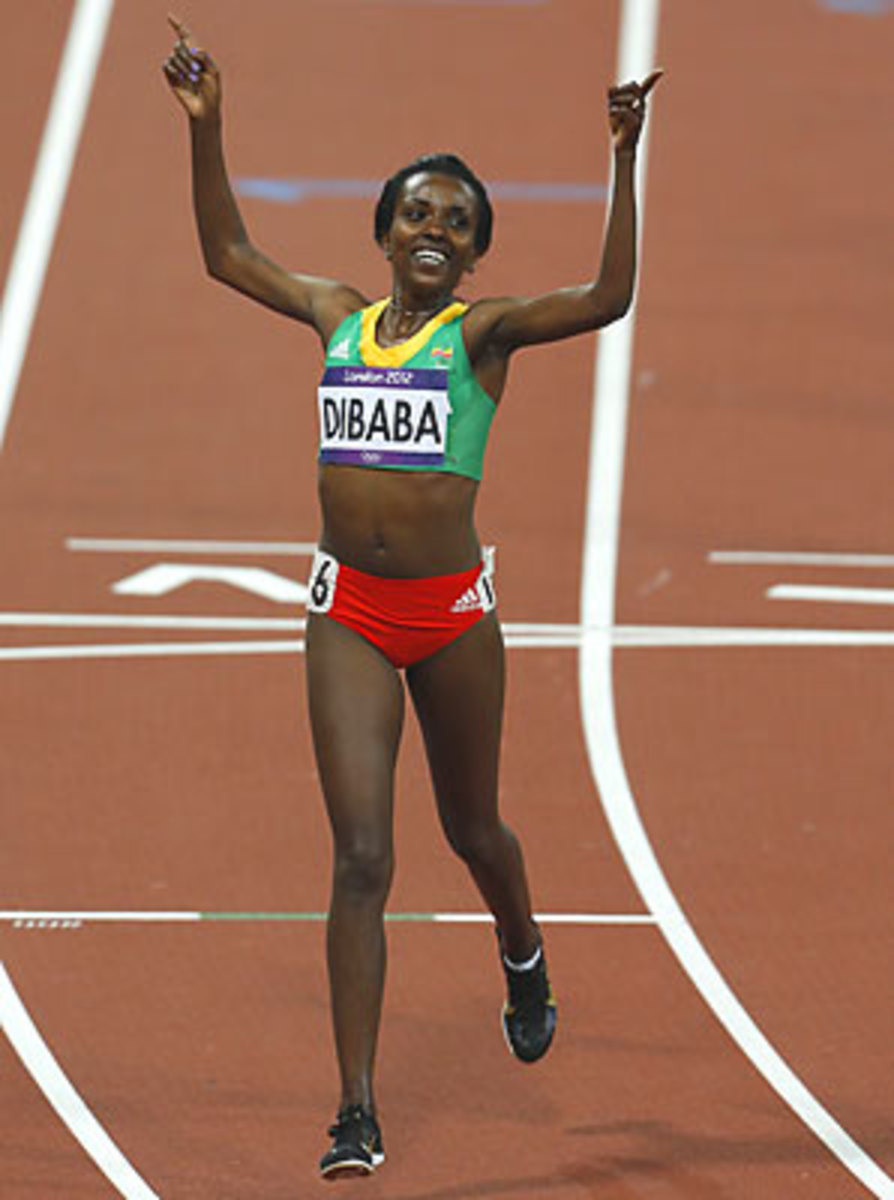With trademark finish, Dibaba repeats as 10,000-meter champion


LONDON -- There are iconic weapons in all of sport: Kareem's skyhook, Nolan Ryan's fastball, Barry Sanders's cutback, Gretzky's eyes. So too, in track and field: Carl Lewis's effortless , form-perfect, mid-race acceleration; Sergey Bubka's gymnastic power in the pole vault, Jackie Joyner-Kersee's bottomless energy and athleticism in the two-day heptathlon. They are feared in the present and remembered in the future, defining pieces of their games. Now to any such list must be added this: Ethiopian Tirunesh Dibaba's finishing sprint, perhaps the most significant force in the history of women's distance running.
On Friday at the Olympic Stadium, on the first night of the track and field competition, in a stadium packed by fans who perhaps bought tickets to join in the rabid support of British heptathlete Jessica Ennis (she leads the competition by 184 points after four events, and could deliver an emotional gold medal on Saturday night, when British distance runner Mo Farah will also be among the favorites in the men's 10,000 meters), Dibaba won the gold medal in the women's 10,000, the first woman in the short history of the women's 10K to win consecutive Olympic golds. And a week from today she will attempt to add the 5,000 meters, matching her historic Beijing double.
She did it Friday night in the same way that she has always done it: By hanging close to the pace -- a strong pace, at the end, no small detail -- for nearly all of 25 laps and then running impossibly fast on the last one. It is a stunning skill, similar to her predecessor, Derartu Tulu, the matriarch of Ethiopian women's distance running, who won the Olympic gold in 1992 and 2000.
Three laps remained in the race when Kenyan Sally Kipyego, 26, took the lead from Ethiopian Werknesh Kidane, who for more than 3,000 meters had run on the front, protecting Dibaba. The field had run through 5,000 meters in only 15:32.06 seconds, typically modest for an Olympic final where runners seeking medals are loathe to sacrifice themselves at the front of a race. But the second half of the race would be far faster, 14:48.69 seconds, a time that is only four seconds slower than Molly Huddle's American record for that distance. Yet Kipyego feared that even such a punishing acceleration might not be enough, because she knew who sat behind her.
Dibaba had won two Olympic gold medals, four world championships and five world cross country championships in the same way. She has come to be called "The Baby-Faced Destroyer,'' (a name that she likes) for the seeming dichotomy of her soft features and devastating kick. Yet there was uncertainty at these Games. Suffering from chronic shin splints, Dibaba had run only one race in all of 2011, and that was a road race on the last day of the year. " had injuries,'' she said. "I didn't think I was going to make it to these Olympics.'' Her first track race in two years was at the Prefontaine Classic in Eugene, Oregon, where she won the 10,000 meters with a kick that didn't gather force until the final 100 meters.
So Kipyego employed the only tactic that a distance runner can use against an opponent with superior speed: The long pull to the finish. "With about three laps to go, I tried to push the pace to make it a little more painful for everyone,'' said Kipyego, who ran at Texas Tech and was the first Kenyan woman to win an NCAA cross country championship. "Unfortunately, it didn't work on [Dibaba]. She was just a little too strong.'' It is a helpless feeling, the inability to shake a kicker, much more so when that kicker is the greatest in history.
Dibaba simply cruised along behind Kipyego and then with 450 meters to run, shot to the front with the same explosive move that has defined her career, not so much sprinting as floating on air, the soles of her shoes nearly brushing her backside. "I was ready to go with 600 or 500 or 400 meters,'' she said after the race. "I waited until after 500 because it was a fast pace.''
Dibaba gapped Kipyego by nearly six seconds over barely a lap and covered her final 400 meters in 62.06 seconds (and the final 800 meters in 2:09) to finish in 30:20.75. It was far off her Olympic record of 29.54.66 in Beijing, when she split 15:10.9/14:43.8 and outkicked Elvan Abeylegesse by less than two seconds for the gold. Kipyego hung on for second place and Vivian Cheruiyot for the bronze medal, Kenya's first two medals in the women's 10,000 meters. (In 2008, American Shalane Flanagan beat out Kenya's Linet Masai for the bronze in the 10,000, meaning, counter intuitively, that the U.S. owned an Olympic 10,000-meter Olympic medal before Kenya).
Dibaba, who is married to former Ethiopian distance runner Sileshi Sihine, a two-time Olympic silver medalist in the 10,000 meters, reiterated after the race that she will run a marathon in 2013. It is a different beast altogether, yet if Dibaba can bring the same finish to that race she will be equally unbeatable. For now, even as she chases yet another gold next week, she has ascended to a rarified place in the history of women's distance running, alongside Tulu and marathoners Paula Radcliffe of Great Britain, Catherine Ndereba of Kenya and the late Grete Waitz of Norway. Still young, she could someday pass them all, probably with a blistering sprint to the finish.
